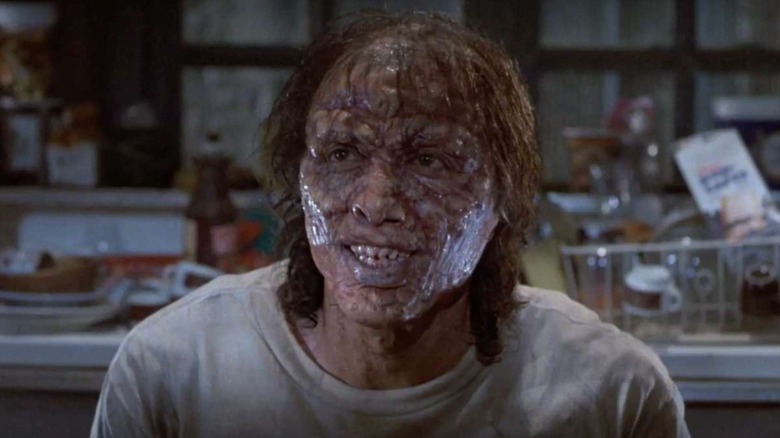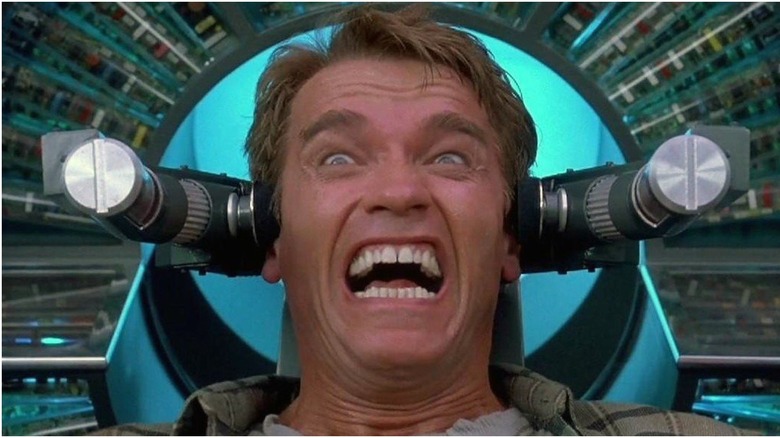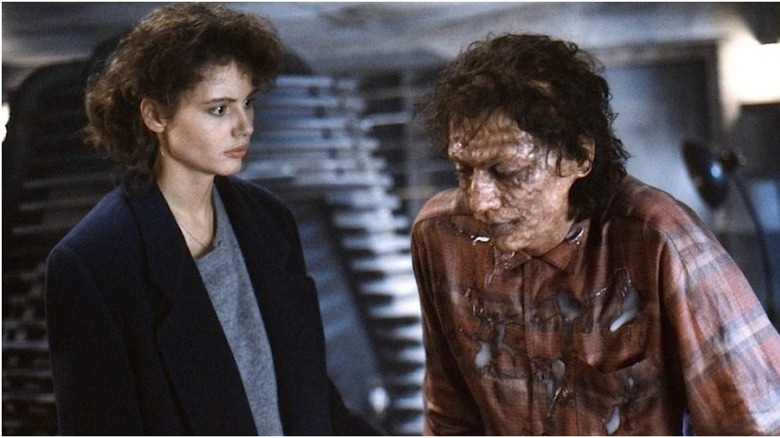Why David Cronenberg's The Fly Almost Didn't Get Made
"Remakes are never as good as the original" is a truism that isn't so true. One of the most compelling cases against this is David Cronenberg's 1986 rendition of "The Fly," a remake of a 1958 sci-fi horror B-movie. Cronenberg's "The Fly" centers on Seth Brundle (Jeff Goldblum), a counterpart to the original's André Delambre (David Hedison). Like Delambre, Brundle is a scientist experimenting with teleportation technology. Things go wrong when a housefly finds it way into one of the teleportation pods; Brundle walks away from an experiment merged with the insect.
Beyond the core premise, the two films are quite different. One important change is that Cronenberg's version doesn't settle for just B-movie scares; instead, it weaves the story into a tragedy. Despite its ultimate brilliance, "The Fly" had to struggle to make it to the silver screen in the first place.
Assembling the crew
"The Fly" remake began with screenwriter Charles Edward Pogue, though little of his vision made it into the finished film. Pogue's lasting contribution was changing the transformation in "The Fly" from instantaneous to gradual. He and producer Stuart Cornfeld agreed this would make for a more compelling story. 20th Century Fox didn't share their enthusiasm and initially passed on Pogue's script. After some wrangling by Cornfeld, Fox agreed to distribute the film, but still wouldn't fund the production. For financing, Cornfeld turned to Mel Brooks, with who he'd co-produced David Lynch's "The Elephant Man." Brooks, famous for directing parody comedies like "Blazing Saddles" and "Young Frankenstein," left his name off the credits, fearing audiences would get the wrong idea about what kind of movie "The Fly" was if they knew he was involved.
With funding secured, the film needed a director, and Cornfeld's first choice was David Cronenberg. The Canadian director was a natural pick; "The Fly" demanded expertise in using extreme and gory SFX, and Cronenberg had already proven himself a master of body horror with "Scanners" and "Videodrome." However, Cronenberg was already committed to an adaptation of Philip K. Dick's "We Can Remember It For You Wholesale," retitled "Total Recall." With Cronenberg unavailable, the producers ultimately selected Robert Bierman to helm "The Fly." Early into pre-production, tragedy struck; Bierman's daughter died in an accident. Bierman was understandably unable to work while grieving, so Cornfeld and Brooks amicably released him from his contract.
By chance, Cornfeld then learned that Cronenberg was no longer attached to "Total Recall" and asked him again to direct "The Fly." Cronenberg agreed on the condition that he could rewrite the script; said rewrite is the blueprint of the finished film. "Total Recall" would eventually see the light of day in 1990, directed by Paul Verhoeven. It earned a remake of its own in 2012; let's just say that one doesn't do a lot for the "remakes can be better than originals" argument.
Selecting the stars
Production troubles didn't stop once Cronenberg was locked in. The film struggled to cast a lead for two reasons. One, "The Fly" still evoked memories of the 1958 original, and convincing actors that a B-movie remake would be worth their time was a challenge. Two, the role of Seth/Brundlefly came with extreme make-up requirements, and putting on such make-up day after day was an experience most actors didn't want to go through. John Malkovich, the first choice for Brundle, declined for these reasons.
Thankfully, Jeff Goldblum wasn't most actors. Then 20th Century Fox President Larry Gordon did not share Cronenberg and Cornfeld's confidence in Goldblum's casting. However, in downright aberrant behavior for a movie producer, he didn't fight or override them. Gordon just told them, "it's your mistake to make. If that's who you want, go make your film with him." Goldblum brought along his then-girlfriend Geena Davis to play Veronica, the reporter in a doomed romance with Brundle. Their real-life romance made their onscreen one all the more believable.
Once "The Fly" hit theaters, all of its troubles melted away. The film hit that sweet spot of being both a critical and popular hit; it grossed $60 million on a $9 million budget, Gene Siskel ranked it as the 10th best film of 1986. Chris Walas and Stephan Dupuis, the film's makeup artists, walked away with a Best Makeup Oscar for how they brought Brundlefly to life. Today, audiences remember "The Fly" as a classic and one of Cronenberg's best. In the world of "The Fly," mankind was not yet ready for Brundle's teleportation technology. In our world, though, it's safe to say audiences were more than ready for the brilliance of "The Fly."


